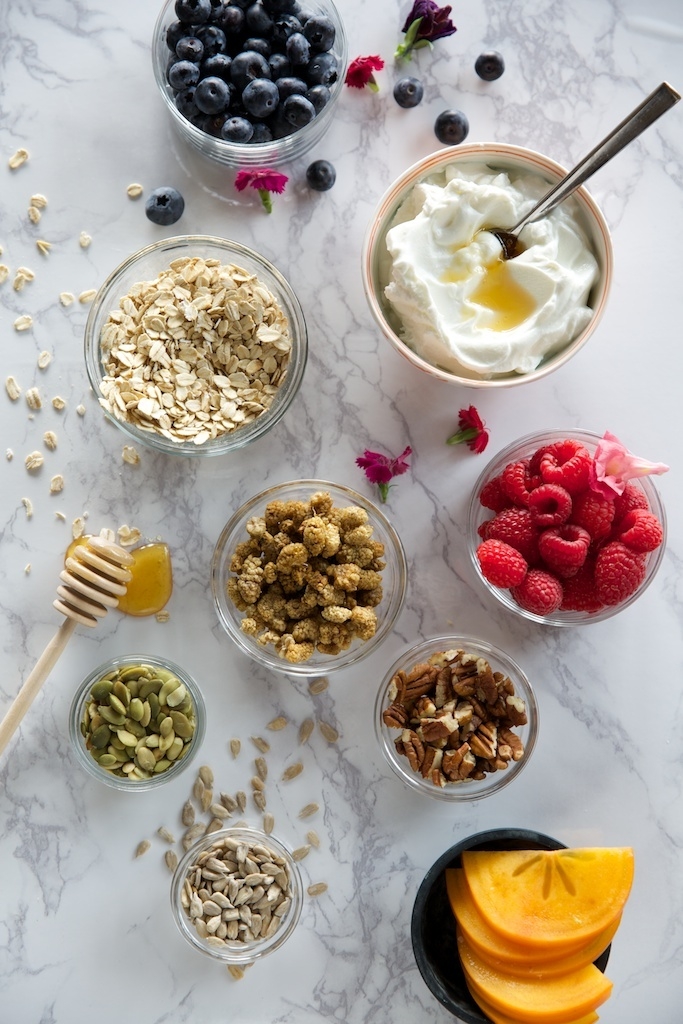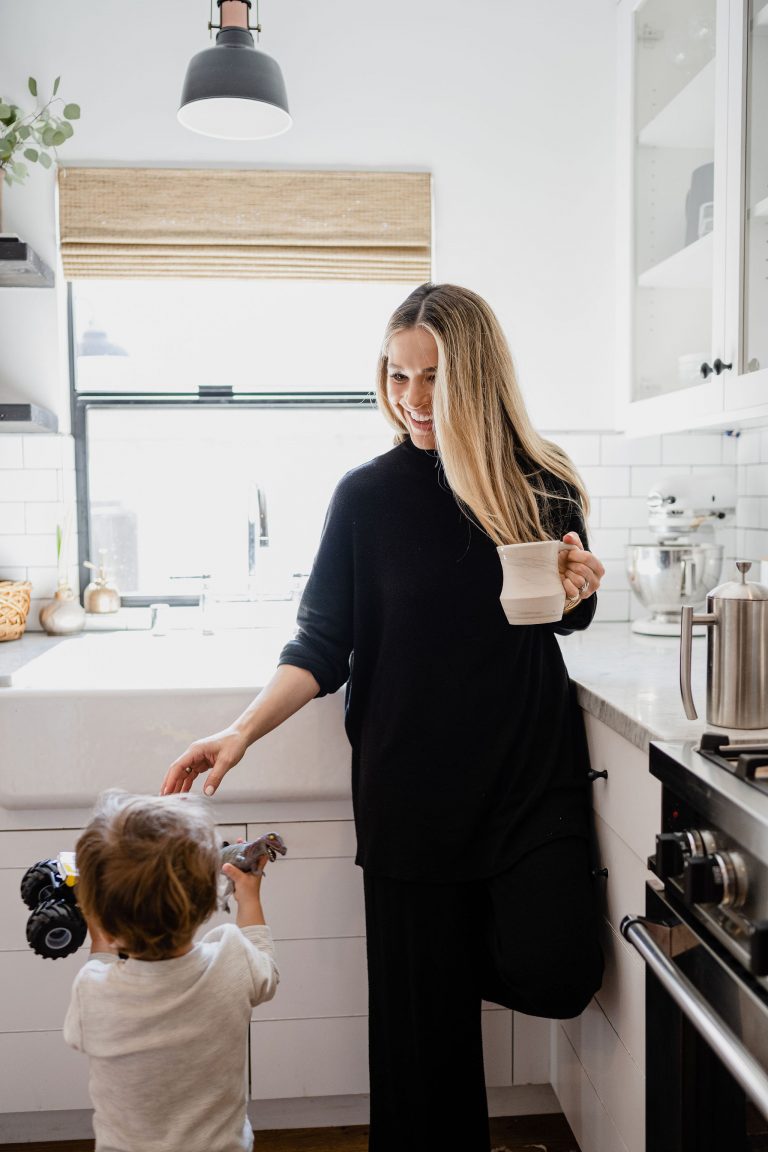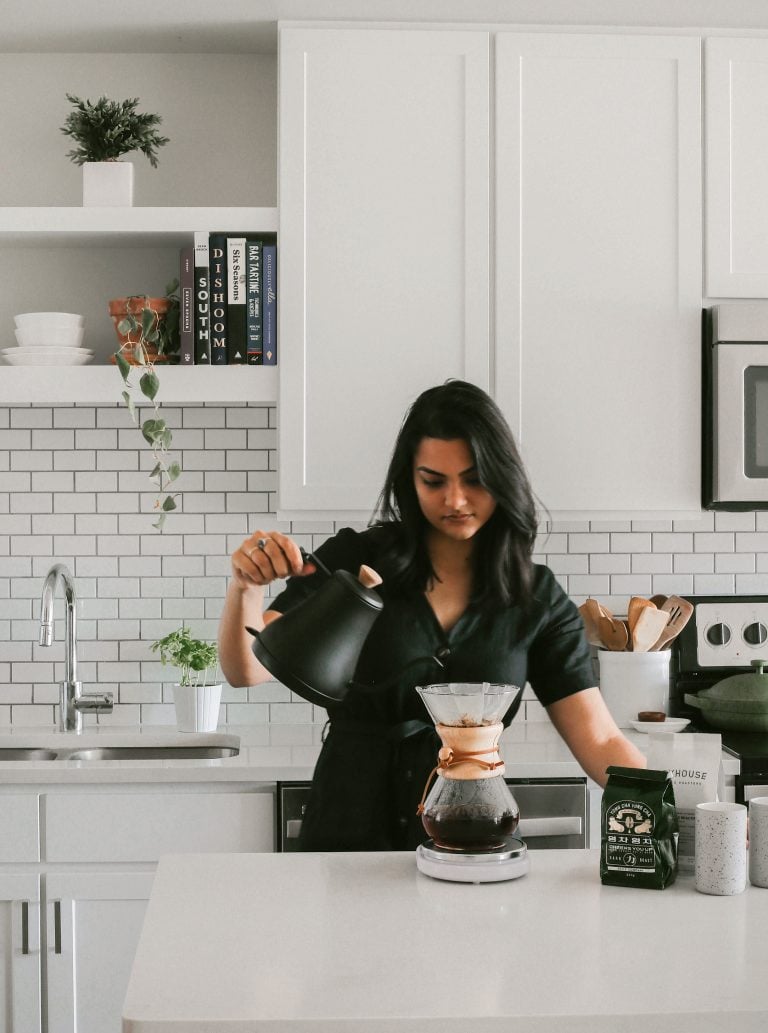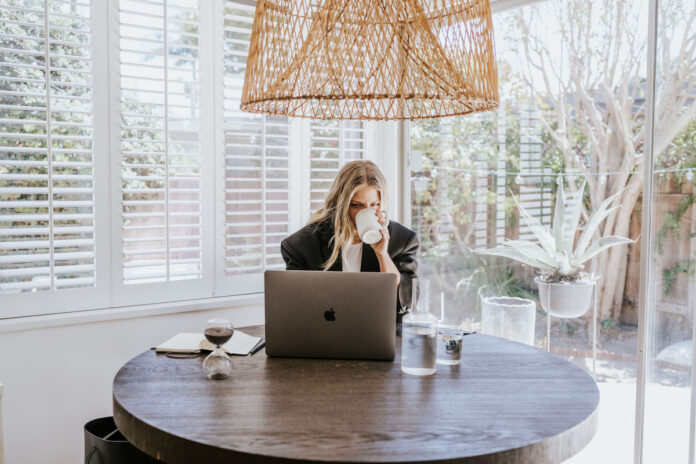few months ago, I began noticing a wellness trend on Instagram that, quite frankly, rocked me to my core. Friends and influencers were waking up, heading to their kitchens, and—gasp of all gasps—not pouring a cup of coffee. Interestingly, they weren’t forgoing their morning caffeine fix altogether, but simply deferring it to a later hour. Which poses the question: When to drink coffee during the day?
A cursory Google search proved confusing, so to cut the stress (which is, coincidentally, what can happen when you drink coffee too early), I tapped a stable of nutritionists—registered dietitian Maya Feller, MS, RD, CDN of Brooklyn-based Maya Feller Nutrition; celebrity chef and nutritionist Serena Poon; and Camille Styles’ own Edie Horstman—to learn more about coffee, cortisol, and circadian rhythms. I even threw in the question all caffeine junkies love: can drinking coffee daily be healthy?
Feature image by Teal Thomsen.

What Is Cortisol?
Before we talk about coffee, let’s talk about cortisol. Often called the “stress hormone,” cortisol is produced by our adrenal glands, and impacts multiple systems throughout the body.
“Along with being responsible for managing your stress response (thus its colloquial name), it also regulates your circadian rhythm which helps your body know when to sleep and awaken,” Poon explains. “Cortisol spikes in the morning when you wake up and ideally wanes throughout the day as you near bedtime. Balanced cortisol levels are important for getting quality, restorative sleep at night.”
Cortisol peaks in the early morning (typically between 8 a.m. and 9 a.m.) then rises and falls throughout the day. When external stressors cause them to spike, our natural energy balance gets thrown off. “Cortisol is affected throughout the day by various stressors and environmental or lifestyle factors,” Horstman adds.
According to Horstman, things that can cause cortisol spikes during the day include:
- sitting inside all day
- eating inflammatory foods
- drinking more than two or three cups of coffee
- a lack of sufficient carbohydrates (particularly in women)
- imbalanced blood sugar

How Does Coffee Affect Cortisol?
Every person responds differently to coffee, but our three nutritionists did agree on one thing: caffeine can cause cortisol to spike a bit, although not nearly as much as something like mental stress. Regular coffee drinkers have also likely developed a tolerance, which decreases the cortisol response over time.
When Is the Best Time to Drink Coffee During the Day?
There does seem to be a recent general rule of thumb that 9:30 a.m. is prime time for drinking coffee, but one specific timestamp does not fit all.
“If drinking coffee at that time makes you feel your best, then go for it!” Poon says. “In my work with clients, we strive to really listen to the messages that their bodies are telling them and find a coffee consumption pattern that best suits their individual needs.”
The nutritionist recommends starting a journal to track how you feel drinking coffee at different times throughout the morning. Log your crashes, how your sleep is affected, and any jittery reactions to find a pattern primed for focus and productivity.

What Are Good Early-Morning Alternatives to Coffee?
If you still want to craft something special to ease into your day, you’re in luck. There are countless healthy coffee alternatives that are just as satisfying as coffee. And for those who may be caffeine sensitive, Feller suggests a cup of herbal tea, which “provides hydration alongside bioactive compounds.”
To add to that list of coffee alternatives, Horstman offers up a turmeric latte, a decaf chai, powdered greens with coconut water, or an adrenal cocktail. If you’re interested in an Ayurvedic solution, Poon shares a satisfying early-morning ritual.
“In the Ayurvedic tradition, it is common to drink a glass of warm water with lemon first thing in the morning to stimulate your digestive fire (or agni), which provides you with energy for the day,” Poon explains. “If you’re looking for another way to get a boost of cognitive energy, a short workout can also help you feel awake and alert without the external stimulation from caffeine.”

Should You Drink Coffee With Food?
While not everyone will be affected by drinking coffee on an empty stomach, it can wreak havoc for some.
“Drinking coffee, on an empty stomach, is basically a double-whammy for our stress hormones,” Horstman shares. “Either eat breakfast first, start with tea, or add some “buffers” to your coffee: L-theanine, collagen, creamer, etc.”
Feller warns against substituting coffee for breakfast, while Poon encourages adding health-supportive spices to your coffee, including cinnamon, nutmeg, and cacao.

Is it Okay to Drink Coffee in the Afternoon?
Ultimately, it’s best to avoid coffee in the afternoon.
“I usually ask my clients to try to avoid afternoon coffee so as to support restorative sleep cycles,” Poon says. “Caffeine has a half-life of about five hours and its effects may be felt for up to 9.5 hours, so you would want to drink coffee at least five hours before you go to sleep. I usually recommend that my clients get their coffee in before 10 a.m.”
Horstman agrees it’s best to avoid coffee after lunch hours, but notes that everyone metabolizes it differently.
If you’re looking for a gentler afternoon boost, consider some of our favorite coffee alternatives, including matcha, which is loaded with benefits that help justify its caffeine.

Is It Okay to Drink Coffee Every Day?
I was thrilled to hear a resounding yes! across the board when it comes to the health benefits of daily coffee.
“Coffee provides one of the most significant amounts of antioxidants in the standard American pattern of eating,” Feller shares. “Research has suggested that drinking coffee may reduce the risk of stroke, dementia, and depression as well as decrease the risk of developing Parkinson’s disease. Coffee, up to levels of about 300 to 400 milligrams per day, has been shown to be safe and healthy.”
Given that the effects of coffee are so personal, it might be helpful to take a holistic approach to coffee consumption. “If my clients are already experiencing chronic stress or are drinking coffee in a way that disrupts their sleep, then we usually work to limit caffeine consumption,” Poon adds.
Author Caitlin Clark




